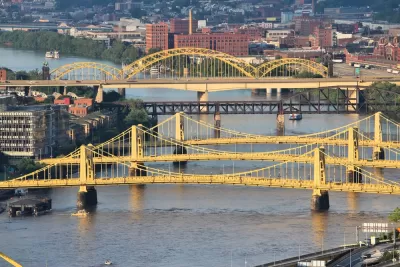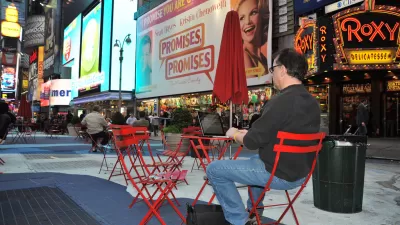Think Columbus, Ohio and Pittsburgh, Pennsylvania.

"It had to happen, but why is it happening now? Secondary tech hubs – outside the orbit of Silicon Valley and New York – are showing undeniable momentum this year," reports Conor Sen.
Sen writes the story after returning from a tour of Columbus, Ohio and Pittsburgh, Pennsylvania with "venture capitalists and team members from the early-stage venture capital firm Bloomberg Beta" for the third round of the Comeback Cities Tour.
A "confluence of forces" has created this momentum for secondary tech cities, according to Sen, such as closing logistical gaps, the spread of urban amenities (the "Brooklyn-ization of America," as described by Sen), lower costs in non-coastal cities, and signals from tech giants.
"As a result, founders and investors are growing more comfortable with companies being founded and scaled outside of traditional hubs," writes Sen.
"It's not clear right now just how transformative or long-lasting this trend could be for secondary hubs. Business people in both cities talked about challenges they share being in nontraditional tech cities: finding workers with startup rather than traditional corporate experience, founders still being somewhat reliant on getting investors in San Francisco or New York to buy into their stories rather than being able to tap local capital, and a lack of successful startup exits or IPOs that would get the local community to have more confidence in startup ecosystems."
FULL STORY: The Year That Big Tech Hubs Got Some Competition

Planetizen Federal Action Tracker
A weekly monitor of how Trump’s orders and actions are impacting planners and planning in America.

San Francisco's School District Spent $105M To Build Affordable Housing for Teachers — And That's Just the Beginning
SFUSD joins a growing list of school districts using their land holdings to address housing affordability challenges faced by their own employees.

The Tiny, Adorable $7,000 Car Turning Japan Onto EVs
The single seat Mibot charges from a regular plug as quickly as an iPad, and is about half the price of an average EV.

As Trump Phases Out FEMA, Is It Time to Flee the Floodplains?
With less federal funding available for disaster relief efforts, the need to relocate at-risk communities is more urgent than ever.

With Protected Lanes, 460% More People Commute by Bike
For those needing more ammo, more data proving what we already knew is here.

In More Metros Than You’d Think, Suburbs are Now More Expensive Than the City
If you're moving to the burbs to save on square footage, data shows you should think again.
Urban Design for Planners 1: Software Tools
This six-course series explores essential urban design concepts using open source software and equips planners with the tools they need to participate fully in the urban design process.
Planning for Universal Design
Learn the tools for implementing Universal Design in planning regulations.
Smith Gee Studio
City of Charlotte
City of Camden Redevelopment Agency
City of Astoria
Transportation Research & Education Center (TREC) at Portland State University
US High Speed Rail Association
City of Camden Redevelopment Agency
Municipality of Princeton (NJ)




























